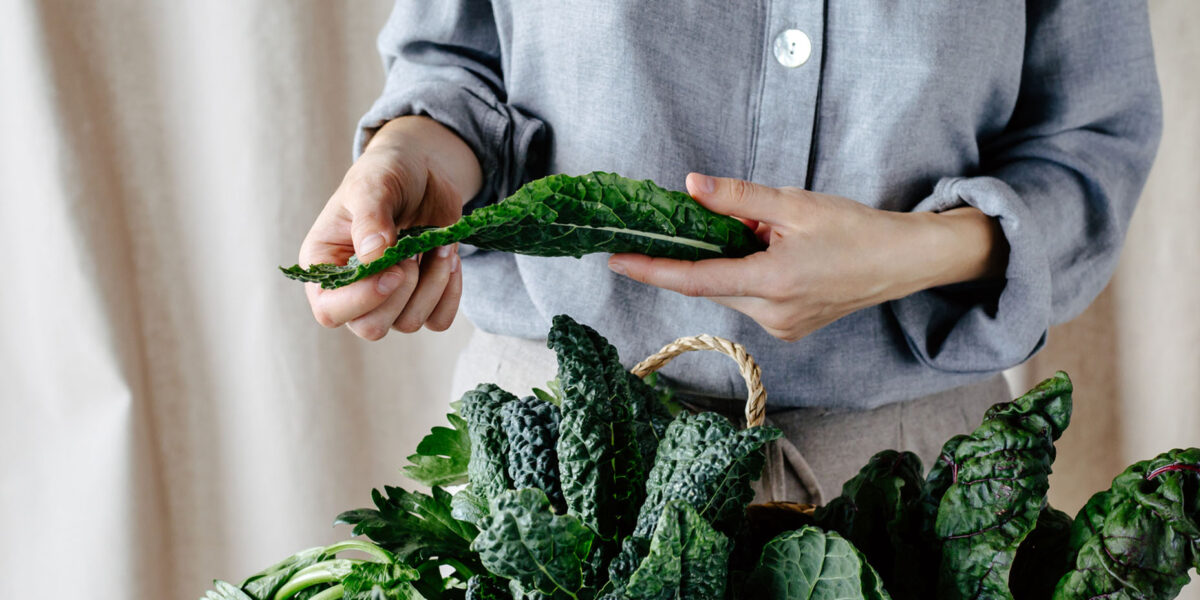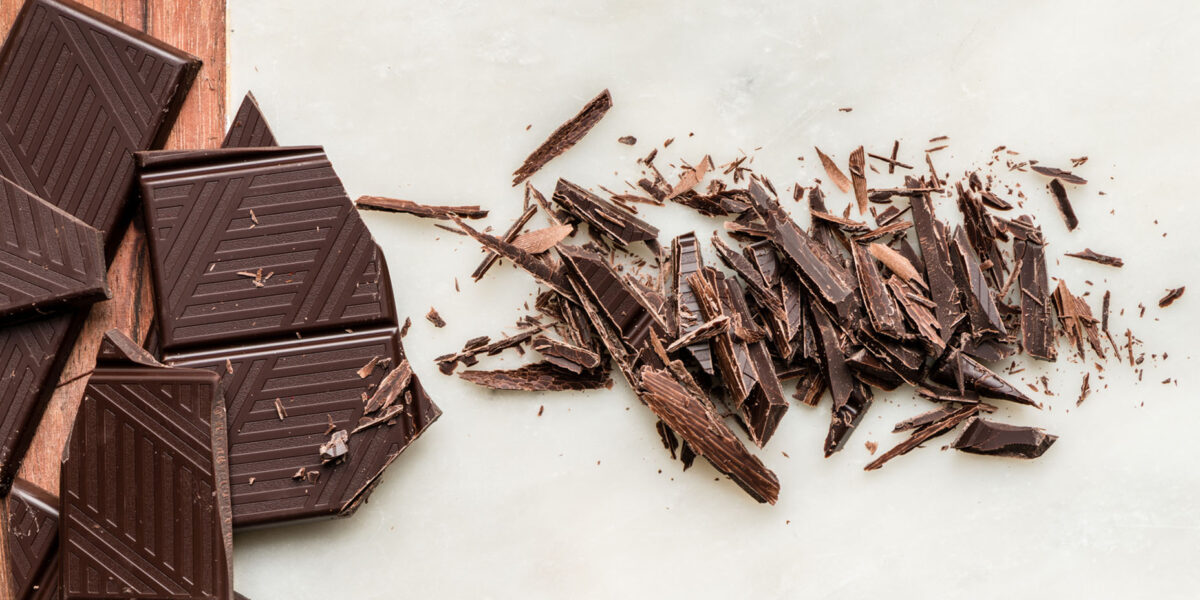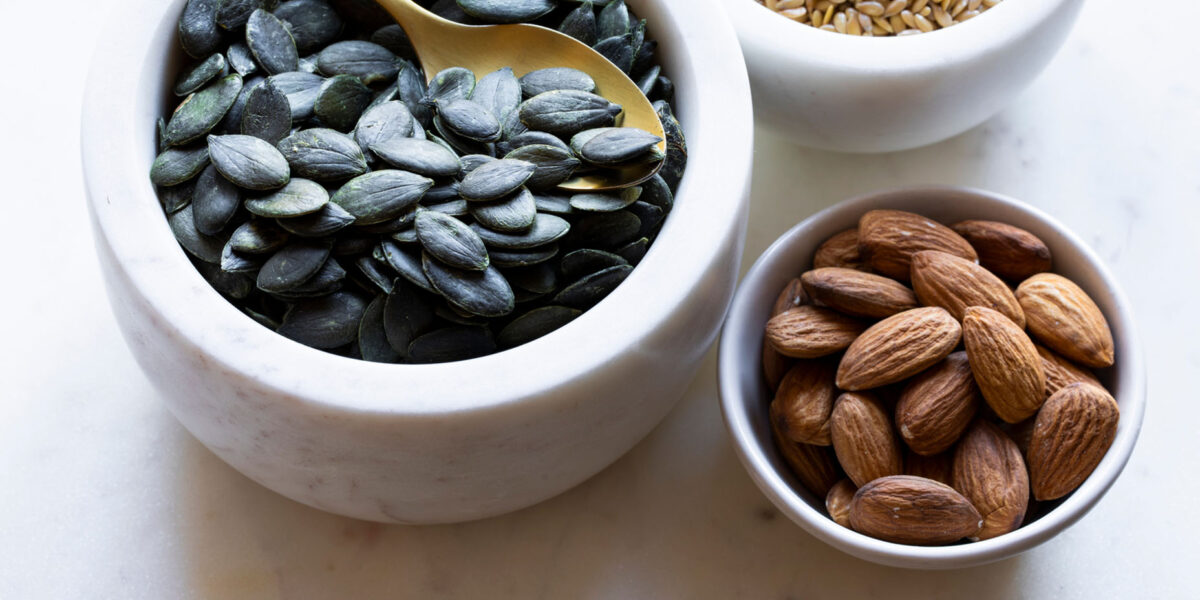Collagen is the most abundant protein in your body, making up around 30% of your total protein mass.1 As a structural protein, collagen plays a crucial role in the health and function of various tissues, including your skin, muscles, bones, and connective tissues.
While your body makes plenty of collagen on its own, emerging research shows that supplementing with collagen may promote various health benefits. But is there a way for plant-based eaters to get the benefits of collagen supplementation without changing their diet?
The research says yes.
This article will explore:
- The research-backed benefits of collagen supplementation
- The connection between collagen and bone health
- How vegans and vegetarians can naturally boost their collagen production without taking any animal-based products
Health Benefits of Collagen
Skin Health
If you’re looking for a way to firm up your skin and enhance its elasticity, collagen may be the way to go.
Collagen makes up a significant portion of your skin’s extracellular matrix (ECM) – the scaffolding that lies beneath your skin surface, which allows it to look taut and firm.2
As you age, your ECM naturally begins to break down, producing fine lines and wrinkles on the surface of your skin. Research shows, however, that when you supplement with collagen, you can enhance the integrity of your ECM and therefore create more youthful-looking skin.3
Other research shows that collagen may play a role in wound healing.4
Joint Health
As a key component of connective tissue, collagen plays an important role in the health and maintenance of your joints. Specifically, collagen supports your cartilage tissue, which wraps around the ends of your bones to protect them and prevent wear and tear.
Cartilage can break down due to excessive use (in athletes, for example), inflammation (like that seen in rheumatoid arthritis), or the natural aging process. When this happens, you start to experience joint pain that can range anywhere from inconvenient to debilitating – depending on the severity of the damage.
Research shows that collagen supplementation may support joint health by providing the building blocks they need to support and protect them from damage.
In one study, participants with rheumatoid arthritis experienced significant improvement in both joint swelling and pain.5 In another study, athletes with activity-related joint pain significantly improved their pain measures at rest and during activity.6

Digestive Support
Although the exact mechanism is unclear, there seems to be a correlation between low serum levels of collagen and inflammatory bowel disease (IBD). One theory is that a deficiency in this structural protein makes your digestive tract more vulnerable to inflammation and therefore sets the stage for digestive issues.7
In one study, participants noticed improvements in bloating and other mild digestive symptoms after a 6-week trial of collagen supplementation.8
Bone Health
We’ve already covered the positive impact collagen can have on joint health, which indirectly relates to the health of your bones. But that’s not the only connection between bone health and collagen status.
Your bones are made up of protein and minerals, with 90% of the bone matrix composed of collagen.9 While minerals provide strength, collagen provides structure and flexibility. Collagen is a vital aspect of bone health because it allows your bones to absorb impact rather than fracture, and to bend instead of break.
Studies show that taking collagen supplements can improve bone mineral density (BMD) in postmenopausal women.10

Is There a Vegetarian Source of Collagen?
Collagen comes from animal sources, so plant-based collagen simply doesn’t exist. One animal-derived collagen, from eggshell membrane, may fit into certain vegetarian diets but isn’t compatible with a vegan or lacto-vegetarian diet.
However, keep in mind that your body makes collagen on its own when provided with the right nutrients. This means that even for the vegan and all the vegetarian folks out there, you can enhance collagen production and gain all of the benefits discussed here; you just need to know which nutrients to incorporate.
Vegetarian Foods and Nutrients That Increase Collagen Production
Vitamin C
Vitamin C adds oxygen and hydrogen to amino acids so that they can do their part in collagen production. If you don’t get enough vitamin C, collagen production will slow.11
Vegetarian vitamin C sources: many fruits and vegetables such as broccoli, Brussels sprouts, cauliflower, citrus fruits, kale, kiwi, mango, papaya, peppers, pineapple, and strawberries.

Proline
Proline and hydroxyproline are amino acids that make up 23% of collagen and have been found to be precursors to sustaining collagen production. They play a key role in the stability of collagen.12,13
Vegetarian proline sources: asparagus, beans, buckwheat, cabbage, chives, cucumbers, garbanzo beans, peanuts, soy, and watercress.
Silica
Silica is a mineral that assists in collagen synthesis, playing a role in the activation of enzymes responsible for collagen production.14
Vegetarian sources of silica: oats, barley, avocados, cucumbers, asparagus, horsetail, nettle, and strawberries.
Strontium
Strontium is a mineral that helps your body make and maintain healthy collagen levels by promoting collagen synthesis while suppressing its degradation.15
Vegetarian sources of strontium: Brazil nuts, milk, cheese, spinach, carrots, peas, beans, and root vegetables.
Unfortunately, although the above options do contain trace amounts of strontium, it’s unlikely that you’ll get enough of this nutrient from diet alone, particularly if you’re looking for bone health benefits. That’s why you’ll want to look for a high-quality strontium supplement like Strontium Boost to fill the gaps.
Copper
Copper increases the production or utilization of collagen and elastin; it also helps facilitate the fibril structure of these proteins.16
Vegetarian copper sources: sunflower seeds, lentils, almonds, apricots, dark chocolate, mushrooms, greens, and blackstrap molasses.

Lysine
Lysine helps to give collagen its stability and structure by assisting in cross-linking. It also increases intestinal calcium absorption.17,18
Vegetarian lysine sources: eggs, dairy products (particularly parmesan cheese), tofu, brewer’s yeast, and spirulina.
Arginine
Research suggests that arginine stimulates insulin-like-growth factor-l (IGF-1) production and collagen synthesis in osteoblast-like cells. In this way, arginine makes the cells in your bone that are responsible for bone growth and mineralization more active.19
Vegetarian arginine sources: eggs, sesame seeds, spirulina, coconut meat, cultured yogurt, kefir, and raw cheeses.
Manganese
Manganese increases collagen and elastin production by increasing the enzyme responsible for proline formation, especially when healing wounds.20
Vegetarian sources of manganese: leafy vegetables, nuts, pineapple, seaweed and other sea vegetables, and whole grains.
Zinc
Studies show that zinc can enhance collagen synthesis while also slowing down its degradation, which in turn helps protect your current collagen stores.21
Vegetarian zinc sources: seeds (pumpkin seeds, in particular), nuts, and beans.

Are Vegetarians Lacking Collagen?
Since your body makes collagen on its own, vegetarians may not necessarily be lacking collagen as long as they’re getting enough of the right nutrients to keep their collagen stores healthy.
With that being said, as our bodies age, collagen production slows down, and the wear and tear of life starts to catch up with us. For this reason, ensuring that your collagen status is healthy as you get on in your years is important whether you’re a vegetarian or not.
Takeaway
When it comes to collagen and bone health, the two big takeaways include:
- Collagen is essential to bone health (and so much more!)
- Your body produces collagen naturally, and will produce more if you eat foods rich in the nutrients listed above. You don’t need to eat meat or take a collagen peptide supplement to maintain proper levels of collagen.
For more information and news regarding bone health and healthy aging, sign up for the AlgaeCal Newsletter.
FAQs
Is there a vegetarian source of collagen?
Collagen comes from animal sources, so there aren’t any collagen sources compatible with vegan or vegetarian diets. However, your body makes collagen on its own when provided with the proper nutrients.
How can vegans increase collagen naturally?
Vegans can naturally increase their collagen production by getting specific nutrients that support collagen synthesis. These include vitamin C, the minerals manganese, zinc, silica, strontium, copper, and the amino acids proline, lysine, and arginine.
What plant-based foods build collagen?
Sources of vitamin C like mango and citrus fruits can assist with collagen production, and mineral-rich vegetables like asparagus, spinach, carrots, and cucumbers. Vegan protein sources like soy, nuts, beans, and spirulina also contribute to the amino acid pool necessary for collagen production.
References
- Stefanovic, Branko. “RNA protein interactions governing expression of the most abundant protein in human body, type I collagen.” Wiley Interdisciplinary Reviews: RNA 4.5 (2013): 535-545.
- Kusindarta, Dwi Liliek, and Hevi Wihadmadyatami. “The role of extracellular matrix in tissue regeneration.” Tissue regeneration 65 (2018).
- Proksch, Ehrhardt, et al. “Oral supplementation of specific collagen peptides has beneficial effects on human skin physiology: a double-blind, placebo-controlled study.” Skin pharmacology and physiology 27.1 (2014): 47-55.
- Nyström, Alexander, et al. “Collagen VII plays a dual role in wound healing.” The Journal of clinical investigation 123.8 (2013): 3498-3509.
- Trentham, David E., et al. “Effects of oral administration of type II collagen on rheumatoid arthritis.” Science 261.5129 (1993): 1727-1730.
- Clark, Kristine L., et al. “24-Week study on the use of collagen hydrolysate as a dietary supplement in athletes with activity-related joint pain.” Current medical research and opinion 24.5 (2008): 1485-1496.
- Koutroubakis, I. E., et al. “Serum laminin and collagen IV in inflammatory bowel disease.” Journal of clinical pathology 56.11 (2003): 817-820.
- Abrahams, Mariette, Rochez O’Grady, and Janne Prawitt. “Effect of a Daily Collagen Peptide Supplement on Digestive Symptoms in Healthy Women: 2-Phase Mixed Methods Study.” JMIR Formative Research 6.5 (2022): e36339.
- Tzaphlidou, Margaret. “Bone architecture: collagen structure and calcium/phosphorus maps.” Journal of biological physics 34.1 (2008): 39-49.
- König, Daniel, et al. “Specific collagen peptides improve bone mineral density and bone markers in postmenopausal women—a randomized controlled study.” Nutrients 10.1 (2018): 97.
- http://lpi.oregonstate.edu/mic/health-disease/skin-health/vitamin-C
- Barbul, Adrian. “Proline precursors to sustain mammalian collagen synthesis.” The Journal of nutrition 138.10 (2008): 2021S-2024S.
- https://hmdb.ca/metabolites/HMDB0000725
- Araújo, Lidiane Advincula de, Flavia Addor, and Patrícia Maria Berardo Gonçalves Maia Campos. “Use of silicon for skin and hair care: an approach of chemical forms available and efficacy.” Anais brasileiros de dermatologia 91 (2016): 0331-0335.
- Wang, Jianguo, et al. “Effects of strontium on collagen content and expression of related genes in rat chondrocytes cultured in vitro.” Biological trace element research 153.1 (2013): 212-219.
- Borkow, Gadi. “Using copper to improve the well-being of the skin.” Current chemical biology 8.2 (2014): 89-102.
- Frey, J., and N. Raby. “Lysine and collagen.” Annales de biologie clinique. Vol. 49. No. 1. 1991.
- Civitelli, Robert, et al. “Dietary L-lysine and calcium metabolism in humans.” Nutrition (Burbank, Los Angeles County, Calif.) 8.6 (1992): 400-405.
- Chevalley, T. H., et al. “Arginine increases insulin-like growth factor-I production and collagen synthesis in osteoblast-like cells.” Bone 23.2 (1998): 103-109.
- https://lpi.oregonstate.edu/mic/minerals/manganese
- Tengrup, I., J. Ahonen, and B. Zederfeldt. “Influence of zinc on synthesis and the accumulation of collagen in early granulation tissue.” Surgery, gynecology & obstetrics 152.3 (1981): 323-326.
- Argyrou, Chrysoula, et al. “Effect of calcium and vitamin D supplementation with and without collagen peptides on bone turnover in postmenopausal women with osteopenia.” Journal of musculoskeletal & neuronal interactions 20.1 (2020): 12.





misty
June 6, 2017 , 12:01 pmVegetarian here! My favorite protein source are local-sourced eggs. I eat at least one a day, but usually shoot for two. Lately I feel like I may be deficient in protein, so I’ve started eating Sacha Inchi seeds daily (8.5 grams per handful serving + lots of good omega 3s).
Love this info above, thanks for sharing!